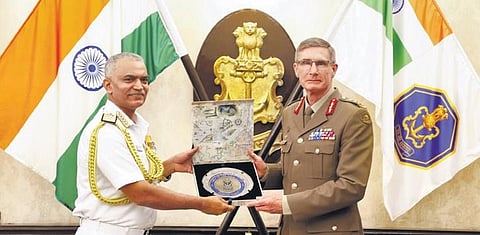

NEW DELHI: When we work in smaller groups, it helps build trust and interoperability, said Indian Navy Chief Admiral R Hari Kumar said on Saturday.“When we work in smaller groups, it serves a lot of purposes. It generates a lot of trust amongst the partner countries. Then, you work towards building capacity, it results in increased interoperability, better domain awareness, regular engagements, and all this is what finally leads to maritime security,” Admiral Kumar said, while speaking on the ‘Future of Conflict’ in the Raisina Dialogue in the capital.
India’s policy for working with other powers in the immediate region is based on the principles of respect, dialogue, peace and prosperity, and the vision of Mission SAGAR or security and growth for all in the region.
“Challenges pertaining to the maritime domain are traditional and non-traditional – and there is need for cooperation. Today we are looking at issue-based convergence and regional groupings can solve regional problems,’’ Admiral Kumar said adding that India looks at everyone in the region to prosper together.
Technological innovations such as space-based surveillance, artificial intelligence (AI) and elint or electronic intelligence are helping India’s maritime commanders have better maritime domain awareness but the Ukraine war has shown the rapidity with which counter-measures are developed for all new technologies, Admiral Kumar said.
“Our oceans are very vast and substantial spaces. In the maritime domain you are always moving. You have to be resilient and stay ahead in terms of technology as there is a possibility of interception,’’ Admiral Kumar said.
The other panelists included Admiral John Aquilino, commander of the US Indo-Pacific Command, the UK Chief of Naval Staff Admiral Sir Ben Key, Chief of Staff of Japan’s defence ministry Gen Koji Yamazaki and the Royal Canadian Navy commander Vice Admiral Angus Topshee.The top maritime commanders discussed a range of issues – from the impact of green fuels on the interoperability and increased engagement of navies to the human element using the latest technologies.